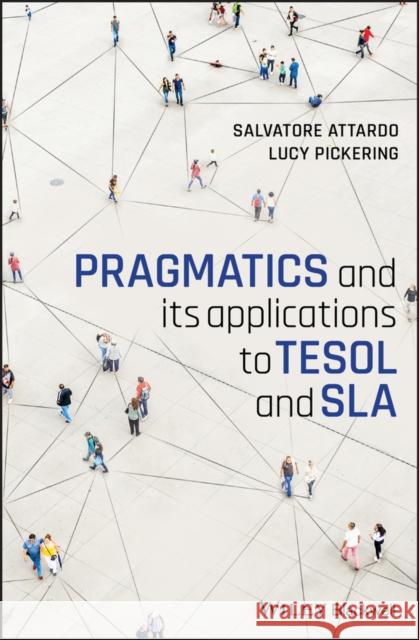Pragmatics and Its Applications to Tesol and Sla » książka



Pragmatics and Its Applications to Tesol and Sla
ISBN-13: 9781119554257 / Angielski / Miękka / 2021 / 272 str.
Pragmatics and Its Applications to Tesol and Sla
ISBN-13: 9781119554257 / Angielski / Miękka / 2021 / 272 str.
(netto: 170,56 VAT: 5%)
Najniższa cena z 30 dni: 177,99
ok. 30 dni roboczych.
Darmowa dostawa!
"The textbook ranges broadly across the field of pragmatics...This has advantages in that an instructor can introduce students to a great many topics and approaches which are likely to get short shrift or no shrift at all in the language textbooks available to learners." - LINGUIST List 33.238, January 2022
List of Tables xiList of Figures xiiiPreface xvTypographical Conventions xix1 Meaning 11.1 What Do We Mean By Meaning? 21.1.1 Semiotics 21.1.2 Extensional and Intensional Semantics 41.1.3 Language in Context 81.1.4 The Semantics/Pragmatics Boundary 91.1.5 Modularity 101.2 A Real Life Application 131.3 Conclusion 142 The Language Teaching and Pragmatics Interface 152.1 Are There Universals in Pragmatics That Students Can Bring To Their L2? 162.2 What Do Learners Typically Transfer From Their L1? 172.3 Can Pragmatics Be Taught Through Instruction? 192.4 Is There a Developmental Path for Pragmatics? 202.5 Is Acquisition of Pragmatics Different for L2 Child and Adult Learners? 212.6 Does the Learner Have To Sound Exactly the Same As a Native Speaker? 222.7 Can Pragmatics Be Assessed in the Classroom? 222.8 Conclusion 233 Speech Acts 233.1 Ordinary Language Philosophy, Oxford, and Austin 243.1.1 Austin and Performativity 263.1.2 Speech Acts, Searle 273.1.3 Realization Patterns 293.1.4 How Speech Acts Work 293.1.5 Indirect Speech Acts 323.1.6 Public Commitment for Speech Acts 333.2 Conclusion 353.3 Speech Acts in SLA and Applications to TESOL 353.3.1 Speech Acts in the TESOL Classroom: Materials 373.3.2 Sample Teaching Materials 394 Grice's Principle of Cooperation 414.1 Gricean Pragmatics as Rational Cooperation 414.1.1 Conversational Cooperation Is Rational 424.1.2 Implicatures 434.1.3 Scalarity and Implicatures 454.1.4 Flouting and Implicatures 464.1.5 Difference between Inferences, Presuppositions, and Implicatures 484.1.6 Developments of Grice's Theory 494.1.7 Modularity in Light of Gricean Pragmatics 554.2 Conclusion 564.3 Applications to SLA 564.3.1 Grice in SLA 564.3.2 Relevance Theory and SLA 594.3.3 TESOL Classroom Materials 614.3.4 Sample Teaching Materials 625 Politeness 645.1 Theories of Politeness 645.1.1 Classical Politeness Theories 655.1.2 Second Wave Approaches (1990 and forward) 705.1.3 Third Wave Theories: Ritualization and Norm 765.1.4 Universality of Politeness 785.1.5 Sociopragmatics and Power 805.2 Conclusion 815.3 Politeness and SLA 815.3.1 Politeness in the TESOL Materials 845.3.2 Sample Teaching Materials 856 Functional Sentence Perspective 876.1 Theoretical Background 876.1.1 Functionalism 876.1.2 Markedness 896.1.3 Word Order 906.1.4 Prominence 926.2 Aspects of FSP 926.2.1 Newness 936.2.2 Known-ness 946.2.3 Definiteness 956.3 Applications of FSP 976.3.1 FSP Reflects the Organization of Ideas in the Mind 976.3.2 Paragraph and Textual Organization 986.3.3 Marked Constructions 986.4 History and Terminology 1016.4.1 The Prague School 1016.4.2 European Functionalism 1026.4.3 Generative Functionalism 1036.4.4 West Coast Functionalism 1056.5 Conclusion 1056.6 FSP in SLA and the TESOL Classroom 1056.6.1 FSP in SLA 1056.6.2 FSP in TESOL 1066.6.3 Sample Teaching Materials 1077 Stance, Deixis, and Pragmatic markers 1107.1 Modality 1117.1.1 Modal Verbs 1117.1.2 Epistemic and Deontic modality 1137.2 Deixis 1147.2.1 Place and Time deixis 1157.2.2 Discourse Deixis 1157.2.3 Social Deixis 1167.3 Pragmatic Markers 1167.3.1 Schiffrin's Discourse Markers 1177.3.2 Procedural Information Markers 1197.3.3 Connectors 1197.4 Stance 1207.5 Corpus-assisted Work 1237.6 Conclusion 1257.7 Pragmatic Markers in SLA and TESOL 1267.7.1 Contrastive and Intercultural Studies in SLA and TESOL 1267.7.2 Sample Teaching Materials 1288 Interactional Sociolinguistics 1308.1 The California Milieu 1308.1.1 The Sociological/Phenomenological Approach 1318.1.2 Conversation Analysis 1348.2 Communicative Competence 1358.3 The Definition of Context 1368.3.1 Context 1368.3.2 Communicative Practices 1388.3.3 Conversational Inferences 1398.3.4 Contextualization 1408.4 Conclusion: Gumperz's Interactionism 1468.5 Sociocultural Interaction and SLA 1478.5.1 Interactional Sociolinguistics in the TESOL Classroom 1518.5.2 Sample Teaching Materials 1519 Data Collection and Research Design in Studies of L2 Pragmatics 1539.1 Discourse Completion Tasks 1539.2 Interactional Studies 1569.2.1 Follow Up Interviews 1579.3 Pseudolongitudinal 1589.4 Longitudinal 1589.4.1 Study Abroad 1599.5 Computer Mediated Communication 1609.6 Action Research 1619.6.1 Student-collected Research 1629.7 Conclusion 16410 Metapragmatics 16510.1 Metalanguage and Object Language 16510.1.1 The Origins of the Language/Metalanguage Distinction 16510.1.2 Uses of Metalanguage in Linguistics 16710.1.3 Metadiscourse 16810.2 Deixis, Indexicality, and the Semiotic Turn in Sociolinguistics 16910.2.1 Deixis 16910.2.2 Indexicality 17010.2.3 The Semiotic Turn in Sociolinguistics 17210.3 Metalinguistic Awareness 17410.3.1 Implicit and Explicit Awareness 17510.4 Ideology, or the Lack of Awareness 17510.4.1 Definition of Ideology 17510.5 Conclusion 18011 Frontier 18111.1 Pragmatic Resources in English as a Lingua Franca 18111.2 Multilingualism 18211.3 Embodied Cognition 18511.4 Complexity Theory 18611.4.1 Complex Systems 18611.4.2 Applications to Linguistics 18811.5 Cyberpragmatics 18911.6 Neuropragmatics 19111.6.1 Lateralization and Specialization 19311.6.2 The Theory of Mind 19411.6.3 Pragmatic Disorders 19511.7 Conclusion 196Bibliography 198Name Index 229Subject Index 239
SALVATORE ATTARDO is Professor of Linguistics at Texas A&M-Commerce, USA. He is editor of The Encyclopedia of Humor Studies (2014) and The Handbook of Language and Humor (2017) and co-author of Understanding Language Structure, Interaction and Variation, Third Edition (2014). He has published 12 books and over 100 articles. His latest book is The Linguistics of Humor: An Introduction (2020).LUCY PICKERING is Professor of Applied Linguistics and Director of the Applied Linguistics Laboratory at Texas A&M-Commerce, USA. She is the author of Discourse Intonation: A discourse-pragmatic approach to teaching the pronunciation of English (2018), co-editor of Language Learning, Discourse & Cognition (2018), co-editor of Talking at Work (2016), and co-author of English Communication for International Teaching Assistants (2013).
1997-2026 DolnySlask.com Agencja Internetowa
KrainaKsiazek.PL - Księgarnia Internetowa









